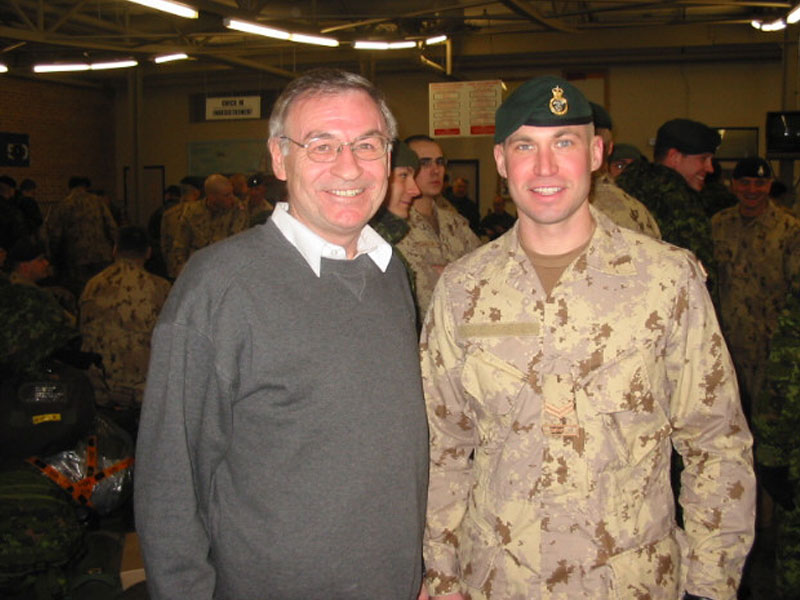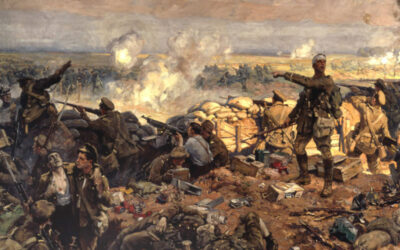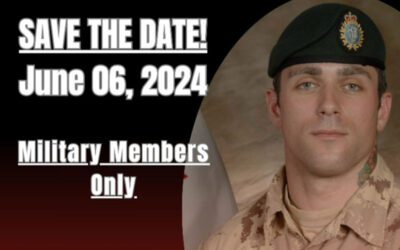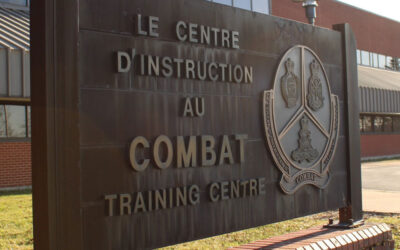Losing a loved one is one of life’s most difficult experiences. For Canadian Armed Forces family members living this reality, the grief they feel isn’t always adequately addressed by civilian bereavement programs. This is the foundation of the Helping Our Peers by Providing Empathy (HOPE) program, which is marking its 15th anniversary.
The program offers compassionate understanding and confidential support that resonates with participants. That’s because it pairs a volunteer who has lost a loved one in the military with a bereaved military family newly coping with a loss. In this peer-to-peer model, HOPE works on two tracks: it helps those who volunteer and those they mentor as both work through their grief in their own way. Peer support has shown to have a significant impact on emotional healing and family wellbeing.
HOPE seeks to demystify grief through the unique power of peer support. No matter how resilient an individual is (and military families show this quality every day) grief is overwhelming. The HOPE program provides family members with realistic and honest expectations so they can learn how to cope with their loss.
Jim Davis knows this all too well. On the morning of March 2, 2006, he received the call all military family members dread, this one from his daughter-in-law Melanie about his son Cpl Paul Davis. “It was as though I was thrown into another dimension. I was spinning out of control in total confusion,” Jim recalls.
It’s a natural reaction for someone in Jim’s situation to want to shut down, to isolate and be alone with their pain. But Jim got another call in April inviting him to attend a focus group in Edmonton. The topic of the meeting was how bereaved military family members can deal with their grief. He accepted because he recognized that that brave step provided “a shining light of hope I knew I had to embrace and follow.”
At that meeting, Jim connected with a father who lost his son 12 years earlier, and found he was able to open up and talk to a group of strangers about the “deep dark pit that I had been thrown into” because they had all been there too.
“While I was doing that, an amazing thing was happening,” Jim remembers. “I could see from their reaction that they could feel my pain and they cared.” And even more incredibly, and surprising to them, the tears of the group slowly turned to laughter.
“Something magical was happening. We were inspired to move forward and form a group that would enable us to reach out and help others who were also suffering from the death of a loved one” in the military family. And, HOPE was born.
Helping guide HOPE, from that very first meeting, is Sophie Richard, the program’s manager. Sophie has watched the program evolve. “Over the last 15 years, I was able to witness the positive impact and value our unique, peer support approach has,” she says.
“Support from the HOPE program has provided an anchor of comfort and empathy to families experiencing grief. Many have told us that the interactions they had with program volunteers after their loss were some of the most helpful to them.”
The HOPE program is available to adult family members in the military and veteran community, at any point in time. The loss doesn’t have to be as a direct result of military service and it doesn’t have to be recent.
“I am so happy that we decided to create this program and that I stayed with it because with each person I can help, it makes me feel good about my son Paul,” says Jim. “He sacrificed his life trying to make this a better world and from his death, through me, he can still help people.”
If you or someone you know is grieving the loss of a military loved one and are in need of support, please contact HOPE at 1-800-883-6094, or by email HOPE-ESPOIR@forces.gc.ca
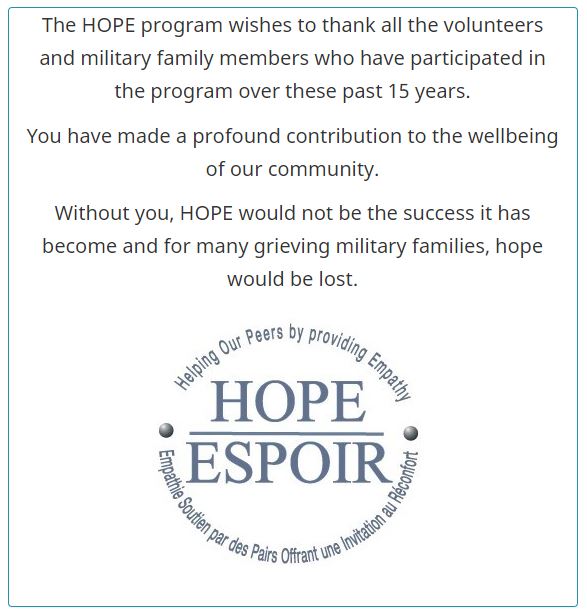
Related Stories
The Pale Green Fog: The Second Battle of Ypres
As they went over the trenches and through the battlefield, they saw a pale green gas in the air that smelled like a mix of ‘pineapple and pepper’, causing severe cough, vomiting, and/or irritation in the eyes. These were the horrific scenes of the Second Battle of...
Lifting for Legacy: Chad O’Quinn Memorial Powerlifting Competition
The annual Chad O’Quinn Memorial Powerlifting Competition will be held at 5th Division Support Base (5 CDSB) Gagetown on June 6, 2024. Registration details will follow as we get closer to the event. The competition will be open only to military members and all...
History of Base Gagetown Part 3: 1968-1999 – The Effects of Unification
From 1968 to 1999, Canadian Forces Base (CFB) Gagetown experienced a period of synergy and unification. On February 1, 1968, the Canadian Forces Reorganization Act unified the Royal Canadian Navy (RCN), the Canadian Army and the Royal Canadian Air Force (RCAF) into a...

